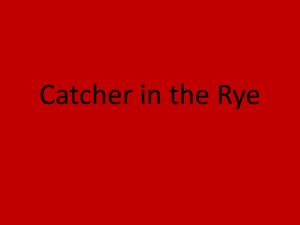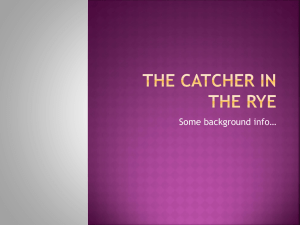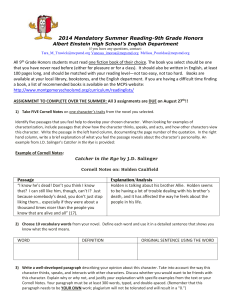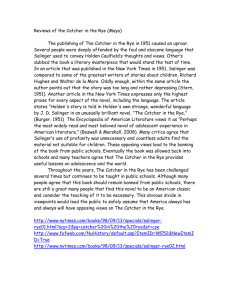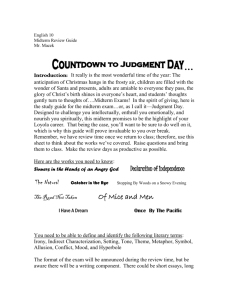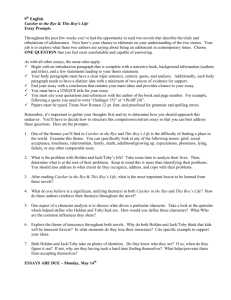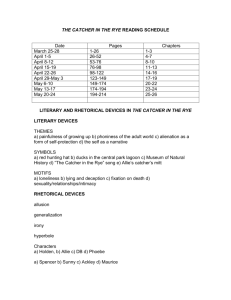Pre-IB 10th grade English Summer Reading File 2014
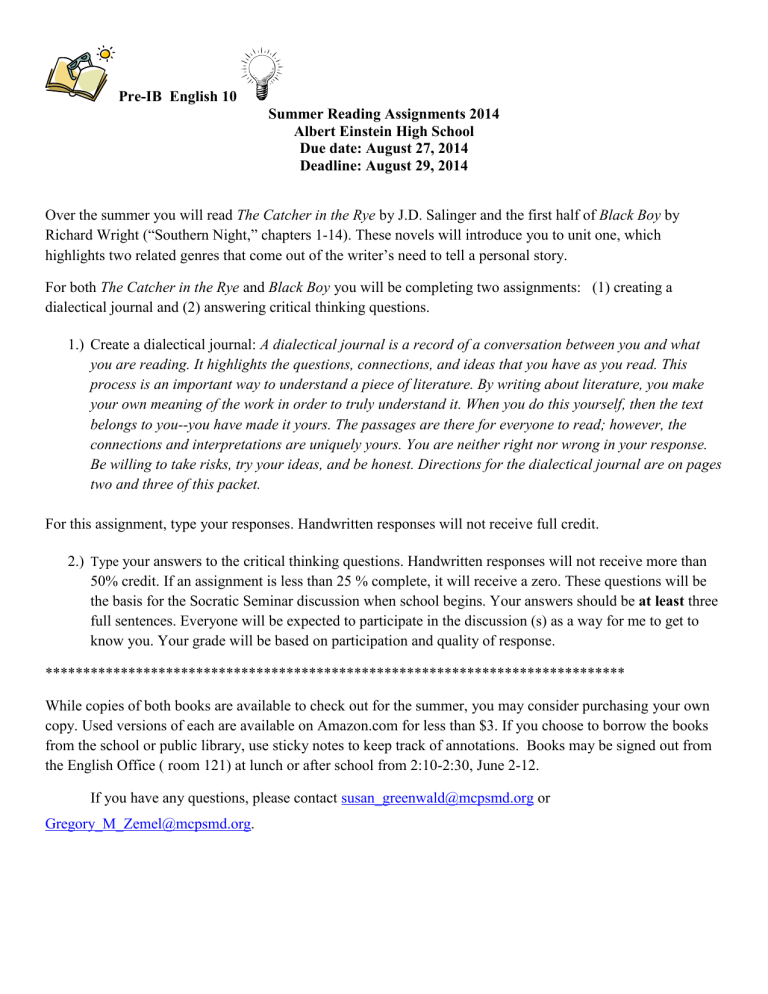
Pre-IB English 10
Summer Reading Assignments 2014
Albert Einstein High School
Due date: August 27, 2014
Deadline: August 29, 2014
Over the summer you will read The Catcher in the Rye by J.D. Salinger and the first half of Black Boy by
Richard Wright (“Southern Night,” chapters 1-14). These novels will introduce you to unit one, which highlights two related genres that come out of the writer’s need to tell a personal story.
For both The Catcher in the Rye and Black Boy you will be completing two assignments: (1) creating a dialectical journal and (2) answering critical thinking questions.
1.) Create a dialectical journal: A dialectical journal is a record of a conversation between you and what you are reading. It highlights the questions, connections, and ideas that you have as you read. This process is an important way to understand a piece of literature. By writing about literature, you make your own meaning of the work in order to truly understand it. When you do this yourself, then the text belongs to you--you have made it yours. The passages are there for everyone to read; however, the connections and interpretations are uniquely yours. You are neither right nor wrong in your response.
Be willing to take risks, try your ideas, and be honest.
Directions for the dialectical journal are on pages two and three of this packet.
For this assignment, type your responses. Handwritten responses will not receive full credit.
2.) Type your answers to the critical thinking questions. Handwritten responses will not receive more than
50% credit. If an assignment is less than 25 % complete, it will receive a zero. These questions will be the basis for the Socratic Seminar discussion when school begins. Your answers should be at least three full sentences. Everyone will be expected to participate in the discussion (s) as a way for me to get to know you. Your grade will be based on participation and quality of response.
*****************************************************************************
While copies of both books are available to check out for the summer, you may consider purchasing your own copy. Used versions of each are available on Amazon.com for less than $3. If you choose to borrow the books from the school or public library, use sticky notes to keep track of annotations. Books may be signed out from the English Office ( room 121) at lunch or after school from 2:10-2:30, June 2-12.
If you have any questions, please contact susan_greenwald@mcpsmd.org
or
Gregory_M_Zemel@mcpsmd.org
.
Critical Thinking Questions
There is more than one right answer. These questions are meant to prompt different perspectives for discussion. Type your answers.
The Catcher in the Rye
1.
How does Salinger tend to end chapters? What do these endings have in common? How do they work to set the tone of the novel?
2.
The Catcher in the Rye centers around a young man – can women relate to this novel, too? What about Holden is gender-specific, and what is common to all teenagers?
3.
How much can we trust Holden's descriptions of other people? Is Ackley really as pimply and disgusting as we're told he is? Is Phoebe really so smart and wonderful?
4.
Is Holden consistent in his actions? Is he a fully developed character? How? Why?
5.
Does the novel end the way you expected? How? Why?
6.
What is the central/primary purpose of the story? Is the purpose important or meaningful?
7.
What is the role of women in the text? Is love relevant? Are relationships meaningful?
8.
Why is The Catcher in the Rye controversial? Why has it been banned?
9.
How does The Catcher in the Rye relate to current society? Is the novel still relevant?
Black Boy
1.
Which childhood incidents alert Richard to the existence of prejudice?
2.
Does it bother you at all to know that many of Wright’s “facts” in
Black Boy are fabrications or misrepresentations?
For example, Wright does not mention that his mother was a successful school teacher and that many of his friends were children of college faculty members. He omits most of his father’s family background, and his own sexual experiences. Reactions from sensitive Southern whites are mainly left out, including those of a family that served as a second home and provided him with more understanding than his own family.
3.
When it was published in 1945, Black Boy was read primarily as an attack on the violence and oppression of the Jim
Crow South; during the 1960s, critics began to focus on the sensibility of the narrator - how his experiences shaped him, how he found his voice and satisfied his yearning for expression. Which view of the novel feels most on target to you?
4.
Trace Richard Wright’s educational background. What events inspired him to become a writer?
5.
What role does religion play in Richard’s upbringing? Why does he consider atheism to be more logical than
Christianity?
6.
Richard’s family migrated from home to home. How does this constant moving shape Richard’s view of the South?
7.
Analyze Richard’s contacts with white employers. What does he learn about social expectations and his own viewpoints with each?
Dialectical Journals – For each of the ten literary elements listed below, you will create one dialectical journal entry. In the end, you will have 10 entries for Catcher in the Rye and 10 for Black Boy . Each entry consists of a quotation from the text (include author and page number in correct MLA format) and your commentary on the entry. Each entry should focus on a literary element.
Literary Elements:
Point-of-view: the perspective from which a narrative is told
Foreshadowing: the use of hints or clues in a narrative to suggest future action
Tone: the author’s attitude toward a subject, character, or audience which is conveyed through his/her word choice
Title: what is the significance of the title of the work? Why does the author choose that specific title?
Conflict: a struggle between forces represented in a work – man vs. man; man vs. nature; man vs. society; man vs. self
Symbol: any object, person, place, or action that has both a meaning in itself and that stands for something larger than itself
Hyperbole: a deliberate, outrageous exaggeration. It may be used seriously or comically.
Allusion: a reference to literature, history, geography, a person/group of people, mythology, or thing
Theme: the central message/lesson of the work. It must be expressed as a complete sentence (not “love” or “war”) and should be applied to more than one specific instance in the work.
Diction: word choice intended to convey a certain effect
SUPERB EXAMPLE
Hyperbole
“The whole lobby was empty. It smelled like fifty million dead cigars. It really did” (Salinger 90).
Holden likes to exaggerate when he wants to emphasize something. The offensive cigar smoke indicates that Holden is scared of becoming an adult. Holden is uncomfortable around adults, so he exaggerates what they do in an unpleasant manner to reinforce his discomfort.
WEAK EXAMPLE
Hyperbole
“The whole lobby was empty. It smelled like fifty million dead cigars. It really did” (Salinger 90).
Cigars are gross, so when people smoke them in lobbies it must smell very badly. Holden does not like the smell. He exaggerates to show how much he doesn’t like the smell.
**Although both examples are based on Catcher in the Rye , you must also create a dialectical journal for Black Boy .
